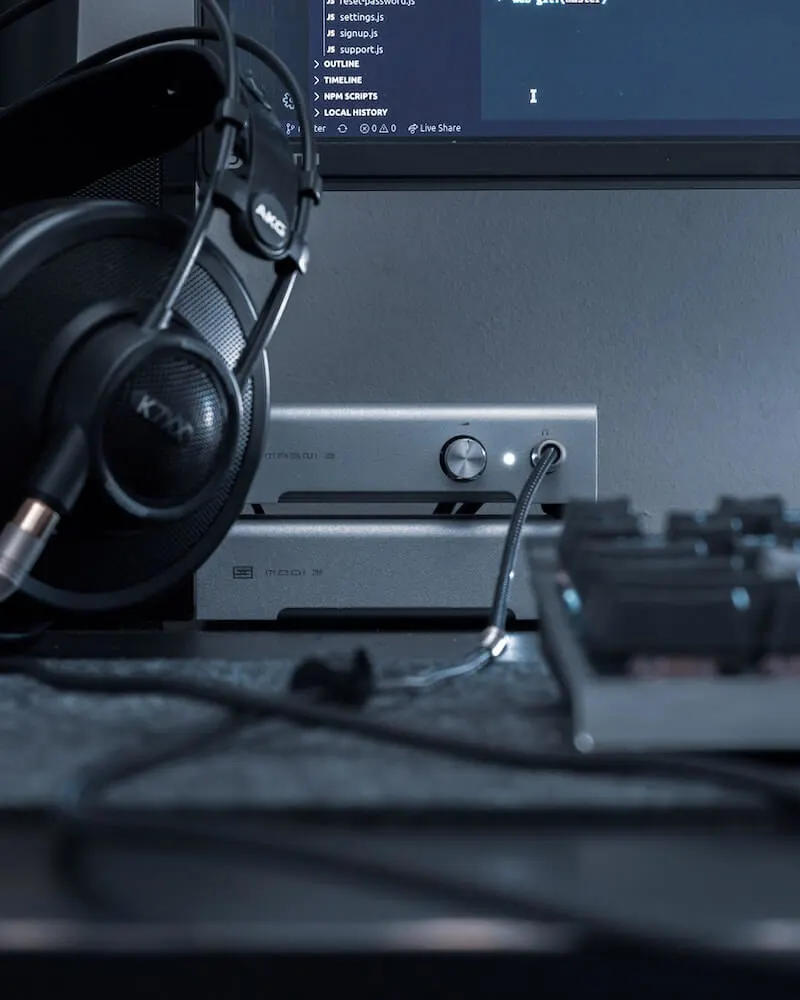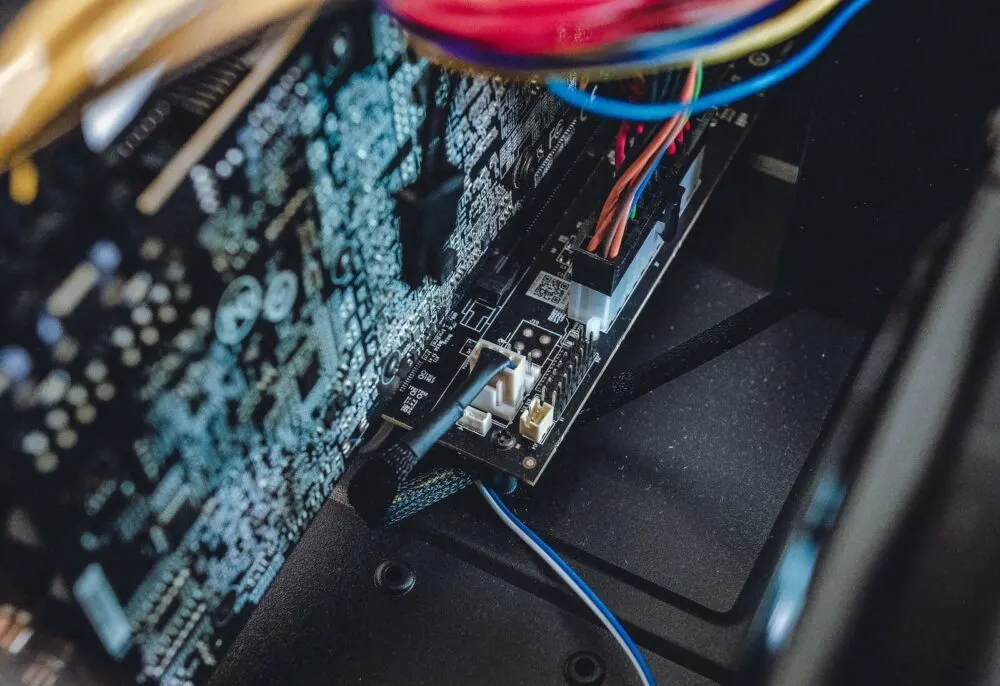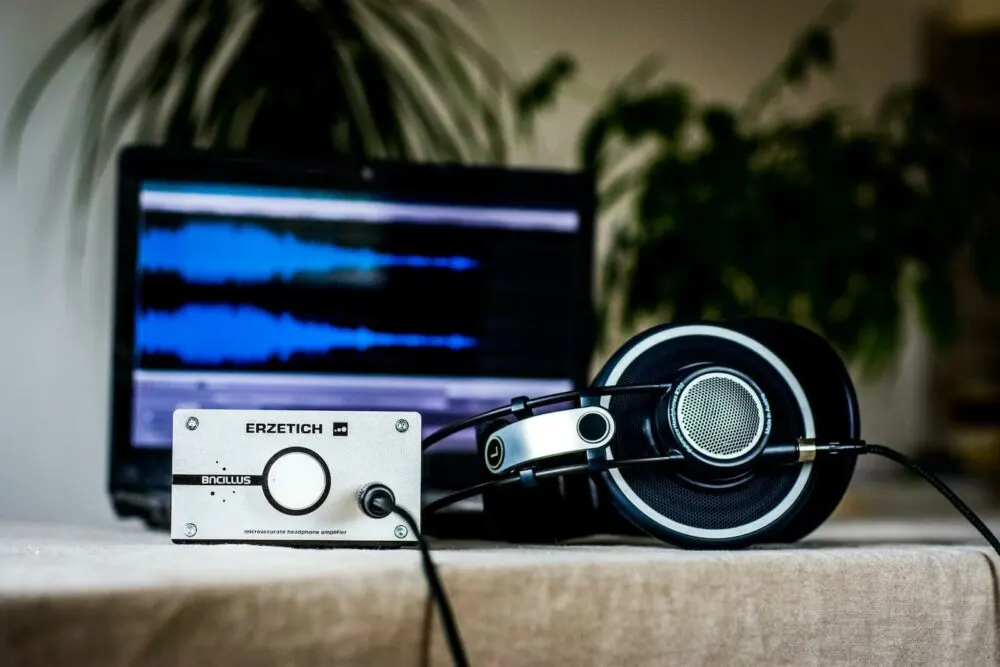Most people think that the integrated audio is good enough when it comes to audio on a PC. However, there are many benefits to using a sound card, which we will discuss. So, do I need a sound card? The answer is not as clear-cut as you may think.
This article will briefly introduce sound cards, what they do, and how they differ from integrated audio. We’ll also cover who might benefit from using a sound card and whether or not it’s worth the investment. So, let’s get started!
What is a sound card?
A sound card is computer hardware that allows you to input and output audio. It typically connects to your motherboard via PCI or USB and has ports for headphones, speakers, and microphones.

Sound cards aren’t as standard as they used to be, as most motherboards now come with integrated audio that can handle basic needs. However, sound cards still offer many benefits over integrated audio.
What does a sound card do?
A sound card converts digital audio signals into analog signals so you can listen to them through headphones or speakers. It also handles the processing of special effects like echo and reverb.
Creative was among the most popular sound card manufacturers in the 90s and early 2000s. However, your regular motherboard has integrated audio that converts digital audio into analog signals.
How is a sound card different vs. integrated audio?
The main difference between sound cards and integrated audio is that they have their processor, which offloads some of the work from your CPU. This can improve audio quality and special effects like EAX support and surround. Sound cards also typically have better input/output options than integrated audio.
It’s worth noting that most CPUs are so powerful nowadays that offloading the audio doesn’t make much of a difference. Even smartphones have powerful enough processors to handle audio processing.

Sound cards have a higher signal-to-noise ratio (SNR), which means they can produce clearer audio and have less background noise/buzzing. They also have lower total harmonic distortion (THD), resulting in less distorted sound.
Also, many sound cards include amplifiers for headphones or speakers, improving audio quality.
Who uses sound cards?
Sound cards are most commonly used by gamers and audiophiles who want the best audio quality. They can also be helpful for people who need to use specialized equipment like microphones or mixers.
People who do streaming or audio recording can also benefit from using a sound card as it comes with more input/output options and supports more channels.
If you buy a pair of high-impedance headphones, you might also need a sound card, as they typically have more powerful headphone amps than integrated audio.
Does a sound card improve your audio?
Sound cards can improve the audio quality of your PC in several ways. As we mentioned, they have higher SNR and THD, which results in better-sounding audio. They also often come with amplifiers, which can improve the quality of your headphones or speakers.
Some sound cards offer special features like Dolby Digital support or virtual surround sound. So yes, in general, a sound card will improve the audio quality of your PC or laptop.
And talking about laptops, remember we mentioned PCI ports and USB? Since laptops are way more popular now than 20 years ago, many USB sound cards are available. Some people know them as DAC or Amplifiers, which do similar functions.
Sound card vs. Amp or DAC
The most common way to connect a sound card to a desktop PC was using the PCI or PCI Express port. This meant you had to connect your audio devices from the rear of the chassis, which could be a pain.
Connecting your audio devices through the front panel meant you suffered from quality loss, as the cables were usually unshielded.

Nowadays, there are way more laptops than desktops, so it only makes sense that USB-powered DACs or Amplifiers are more popular. And they sound just as good as regular sound cards! They even look super cool sometimes!
A DAC is a digital-to-analog converter. It takes a digital signal and converts it into an analog signal. Sounds familiar?
And an AMP is an amplifier. It takes a low-power signal and strengthens it so you can listen to it through headphones or speakers.
Most AMPs have an integrated DAC. And yes, soundcards do both functions as well. So they’re pretty much the same, but we connect them via a USB port and have fancy designs to be aesthetic on our desks.

Each brand comes with different software and audio presets, though. Some of them even have cool RGB lights!
Is a sound card worth it?
If you’re looking to improve the audio quality of your PC or laptop, a sound card is worth considering. They offer better audio quality than integrated audio and often come with extra features like amplifiers and support for multiple channels.
They can be an excellent investment for gamers or audiophiles who want the best possible audio experience. And if you use streaming or recording software, a sound card can also be helpful as it offers more input/output options and higher power output.
However, the truth is most people won’t notice a huge difference in audio quality between a sound card and integrated audio unless you play them side-by-side.
Do I need a sound card, then?
The bottom line is that it depends on what you need and how much you’re willing to spend. An external DAC or amplifier might be better if you want better audio quality.
For most people, a sound card isn’t worth the money. Buying a better pair of speakers or headphones will improve your audio experience more than a sound card.
But a sound card is worth considering if you’re an audiophile or gamer who wants the best possible audio quality. If you have a pair of headphones with high impedance (if you don’t know what that is, chances are you don’t have them) or if you want to use multiple speakers for surround sound and multiple audio effects, then a sound card is probably a good investment.
Sound cards cost anywhere from $50 to $200, so it’s not a small purchase. But a sound card can make a big difference if you’re serious about audio quality.
Can a sound card act as an audio interface?
In answering the question “Can a sound card act as an audio interface?”, it is important to consider the functionality and interchangeability of the terms “sound card” and “audio interface”.
A sound card is a hardware component installed in a computer that allows for the input and output of audio signals. It typically includes analog-to-digital converters (ADCs) for recording analog audio and digital-to-analog converters (DACs) for playing back audio signals. Sound cards are primarily designed to enhance the audio capabilities of a computer, such as improving the quality of audio playback or adding extra audio features.
On the other hand, an audio interface is a device or a combination of devices that facilitates the input and output of audio signals between a computer and external audio devices, such as microphones, instruments, or studio monitors. Audio interfaces often include higher-quality ADCs and DACs, multiple input and output channels, and additional features like preamps and MIDI connectivity. They are specifically designed to provide professional-grade audio input and output capabilities for recording, producing, and monitoring audio.
While sound cards and audio interfaces share some common functionalities, such as ADCs and DACs, they are not entirely interchangeable. Sound cards primarily serve the purpose of enhancing audio capabilities within a computer, while audio interfaces are specifically designed to provide a comprehensive set of tools and features required in professional audio recording and production environments.
Therefore, while a sound card may offer some functionality similar to an audio interface, particularly with basic audio input and output, it may not provide the same level of professional-grade features or performance that an audio interface would offer. Depending on the specific requirements and desired audio quality, it is advisable to consider investing in a dedicated audio interface for professional audio recording and production purposes.
When should you buy an external DAC and amplifier?
When considering the purchase of an external DAC and amplifier, there are a few factors to keep in mind. Firstly, if you own a laptop or a compact computer unit, it may not be feasible to add a PCI or PCIe-based sound card. In such cases, an external DAC and amplifier come into play as a suitable alternative.
If your audio needs involve both analog inputs and outputs, such as for recording, streaming, or podcasting, you may want to consider audio interfaces. Another option to explore would be acquiring a USB microphone along with a DAC. These external units are designed to connect to computers or phones using a USB cable, with the advantage of being portable and versatile. It’s worth noting that the type or quality of the USB cable itself does not significantly impact performance.
By utilizing a DAC, you can ensure an analog output similar to that of a sound card but positioned externally from the computer. However, before finalizing your purchase, it’s crucial to confirm whether the DAC includes a volume knob or buttons. Additionally, consider whether the DAC unit provides sufficient output for your specific speakers or headphones. In some cases, it may be necessary to supplement the DAC with an amplifier to achieve the desired audio levels.
Should you get a sound card when you need more ports?
When it comes to the question of whether you should acquire a sound card when you require additional ports, the answer is affirmative. Sound cards offer the advantage of expanding the number of ports available on your computer, allowing you to connect a greater variety of audio peripherals.
Not only do sound cards provide extra ports, but they often come equipped with specific features that can enhance your audio experience. For instance, if you are a music producer or interested in recording with your computer, obtaining a high-end sound card or audio interface is highly recommended. These advanced units typically incorporate the necessary hardware to monitor and record audio output. Additionally, they often include a built-in headphone digital-to-analog converter (DAC) and amplifier, providing comprehensive capabilities for sound reproduction.
By incorporating a sound card into your setup, you can benefit from added ports to accommodate the devices you need, while also enjoying the enhanced functionality and versatility that these cards offer.
Should I get a DAC instead?
“Should I get a DAC instead? An external DAC or amplifier might be better if you want better audio quality. For most people, a sound card isn’t worth the money. Buying a better pair of speakers or headphones will improve your audio experience more than a sound card. However, if you’re looking for a more cost-effective and versatile option, a cheap DAC/amp assembly could be a viable choice. These assemblies are generally cheaper and easier to use with different computers over time, as they connect with a normal USB cable. This means they can last you longer and provide a seamless experience across various devices. So, if you value affordability, compatibility, and longevity, a cheap DAC/amp assembly could be a worthwhile investment.”
Should you buy a sound card if your music sounds bad?
“There you have it. Now that you know the difference between a sound card and integrated audio and the pros and cons, you can decide which is right for you. But let’s dive a bit deeper into the question of whether you should buy a sound card if your music sounds bad.
A sound card can be a potential solution to address issues with audio quality. It offers a way to bypass the limitations of the motherboard’s circuitry by shielding internal components and creating distance from the noisiest parts of your PC. This means that even a less-than-ideal sound card can still provide a slight improvement over the stock setup, especially if you can audibly hear issues with your current audio configuration.
However, it’s important to note that in most cases, purchasing a sound card is not a necessity for achieving better audio. While it can offer some benefits, it may not be the magical fix for all audio problems. Factors such as the quality of your speakers or headphones, the source of your music files, and even the audio processing capabilities of your software can also play a significant role in determining the overall sound experience.
So, before rushing to buy a sound card, consider evaluating your entire audio setup. Take into account any audible issues you may be experiencing, as well as the specific requirements and goals you have for your audio quality. By doing so, you can make an informed decision on whether investing in a sound card is the right step for you.
We hope this article has shed some light on the question of whether you should buy a sound card if your music sounds bad. If you have any further questions or need more guidance, feel free to let us know in the comments. And don’t forget to explore our other articles covering a wide range of audio-related topics. Thank you for reading!”
When should you buy a sound card?
Should you get a high-end sound card or audio interface for music production and recording?
If you are involved in music production or plan to record with your computer, it is recommended to invest in a high-end sound card or audio interface. These devices typically have the necessary hardware for monitoring and recording output, and they offer the same capabilities as a headphone DAC and amp built-in. This ensures optimal performance and flexibility in professional audio production and recording tasks.
Should you get a sound card when you need more ports?
If you have a desktop setup with studio monitors, microphones, and headphones, you may require additional inputs and outputs that your PC does not provide. Sound cards often offer the option to add optical out, surround sound out, and more, making them a suitable solution for expanding your connectivity options.
Will a new sound card improve lossless audio quality?
In cases where your computer lacks an audio output or only offers subpar options like Bluetooth, a sound card or external DAC and amplifier becomes necessary to enjoy lossless audio. While such situations are rare nowadays, investing in a sound card or DAC can significantly enhance your audio experience.
Should you buy a sound card if your music sounds bad?
If you are experiencing poor PC audio due to component-produced noise or a lack of shielding around the motherboard, purchasing a sound card can help alleviate the issue. Sound cards have internal shielding and are positioned away from the noisy parts of your PC, resulting in improved audio quality compared to the motherboard’s circuitry.
“If you’re an audiophile or gamer who wants the best possible audio quality, a sound card is probably a good investment. A sound card can enhance your listening experience, especially if you have headphones with high impedance or if you desire to utilize multiple speakers for surround sound and various audio effects. It provides the opportunity to immerse yourself in a rich and immersive audio environment, bringing your games, movies, and music to life.
In addition to catering to the needs of audiophiles and gamers, a sound card can also address specific scenarios where default audio options may not be sufficient. For instance, if you encounter poor audio quality with your current sound setup, a sound card can offer an improvement. It is particularly useful in cases where component-produced noise and lack of shielding around the motherboard are responsible for subpar PC audio. By shielding internal components and creating distance from the noisiest parts of your PC, a sound card can effectively minimize these issues and provide cleaner audio output.
Furthermore, a sound card can be a valuable addition for those who require additional audio ports. If you have a desktop setup with studio monitors, microphones, and headphones, you may find yourself in need of more inputs and outputs. Sound cards often offer the flexibility to add optical out, surround sound out, and other port options, allowing you to connect and manage your audio devices seamlessly.
Moreover, if you are involved in music production or are interested in recording with your computer, a high-end sound card or audio interface is highly recommended. These advanced units typically feature the necessary hardware for both monitoring and recording audio. They offer the same capabilities as a headphone DAC and amp built-in, enabling you to achieve professional-grade audio recordings and precise control over your sound output.
In summary, if you value top-notch audio quality, use high-impedance headphones, desire surround sound setups, or require more audio ports, investing in a sound card can significantly enhance your audio experience. Whether you’re an avid gamer, a discerning audiophile, or a music enthusiast, a sound card provides the means to elevate your audio enjoyment and unlock the full potential of your audio devices.”
Do I need a Sound Card? The bottom line
There you have it. Now that you know the difference between a sound card and integrated audio and the pros and cons, you can decide which is right for you.
We hope this article helped clear things up for you. Let us know in the comments if you have any questions. And be sure to check out our other articles on all things audio! Thanks for reading!